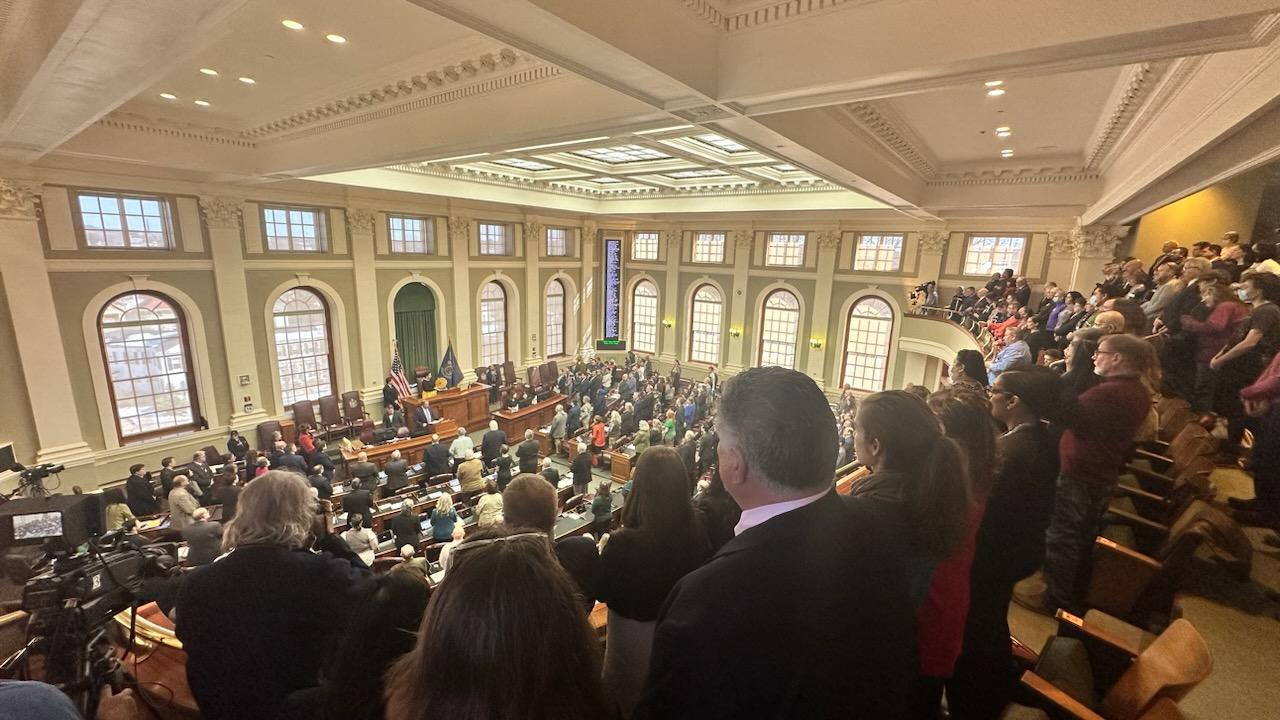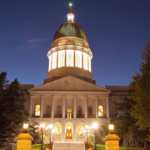The State of the Tribes address to the joint session of the Maine Legislature opened with the “Welcome Song,” sung by Passamaquoddy citizen Lauren Stevens. Click here to watch a video of the full address.
In a momentous address to the Legislature, five Wabanaki Nations Chiefs, Chief Clarissa Sabattis, Chief Rena Newell, Chief Kirk Francis, Chief Edward Peter-Paul, and Chief William Nicholas reminded the audience of state legislators, Congressman Jared Golden, Maine Supreme Court justices, Maine Constitutional Officers, many Wabanaki guests, and the public that they seek recognition in law and policy what already exists in reality, Wabanaki inherent sovereignty. Wabanaki chiefs praised legislators for the effort they have given in the 131st Legislature to learn more about their communities and the failings of the Maine Indian Claims Settlement Act (MICSA). Wabanaki Nations have been focusing their diplomacy on LR 1184 An Act Implementing the Recommendations of the Task Force on Changes to the Maine Indian Claims Settlement Implementing Act. (Click here to watch the full address.)
“I support LR 1184,” declared Houlton Band of Maliseet Indians Chief Clarissa Sabattis. “We need the space to self-determine our own destinies. While our rights to exercise our own jurisdiction were never removed, the Maine Indian Claims Settlement Act also encourages us to negotiate jurisdictional agreements with the State of Maine. Passage of this bill is a step in the direction to self-determination.”
Speaking to the historic nature of the day and the ever-increasing support Wabanaki Nations have been receiving inside and outside the Legislature, Penobscot Nation Ambassador Maulian Dana, President of the Wabanaki Alliance board, stated, “The Wabanaki Alliance and our coalition partners are so pleased that the legislative leadership, Speaker Talbot Ross and President Troy Jackson, have invited the Tribal Chiefs to give the first State of the Tribes Address in over two decades. This historic moment comes as we continue to work towards the State of Maine recognizing the inherent sovereignty of Wabanaki people in our homelands by considering amendments to the oppressive 1980 Maine Indian Land Claims Settlement Act. We are thankful for the energy and momentum we have created over the last few years and for the work and sacrifices of all the tribal leaders that came before us. We hope that the advocacy we have initiated and relationships we have forged with lawmakers continue to enrich our efforts and that the words and wisdom of the Chiefs can further educate our friends in both chambers.”
The five Wabanaki chiefs stressed the importance they and their Peoples place on relationships. They have been encouraged by the multiple trips legislators have made to their communities during the initial three months of the legislative session and the time they have devoted analyzing the recommendations of the Task Force on Changes to the Maine Indian Claims Settlement Implementing Act.
Chief William Nicholas of the Passamaquoddy Tribe at Motahkomikuk said, “Today was a historic event in the State Legislature. I am grateful to House and Senate leadership in both parties for making this State of the Tribes address possible. The Passamaquoddy Tribe is proud to be forging new positive bipartisan relationships in the Legislature and we look forward to working with our friends in both parties to improve economic development and the delivery of services in tribal and non-tribal rural communities in Maine.”
Chief Rena Newell of the Passamaquoddy Tribe at Sipayik offered reflections on her time in the Maine House and the improving relationship between Wabanaki Nations and the Maine Legislature. “Thank you to Speaker Talbot-Ross, House Minority Leader Faulkingham, President Jackson, and Senate Minority Leader Stewart for the opportunity to address both chambers of the Maine Legislature today. It was nice to be back on the House Floor after my time in the Legislature over the past four years. Over these past 4 years, the Wabanaki Nations and the Legislature have seen growing momentum with respect to collaborative policymaking and relationship building. Today is a sign that our momentum will only increase and, for this reason, I am excited for what the future holds for Wabanaki-State relations.”
The State of the Tribes address, the first since 2002, follows a presentation made to the Maine Legislature on March 9 by Dr Joseph P. Kalt, principal co-author of a 69-page report by the Harvard Project on American Indian Economic Development, based in the Ash Center for Democratic Governance and Innovation at the Harvard Kennedy School. The report details economic opportunities that have been lost to the Maliseet, Mi’kmaq, Passamaquoddy, and Penobscot Nations and rural Maine due to the 1980 Maine Indian Claims Settlement Act. The report identified that MICSA’s restrictions on Wabanaki self-government is the leading contributor to the Wabanaki Nations poor economic performance compared to the other 570 federally recognized tribes.
“The time for the State of Maine to recognize the inherent sovereignty of the Mi’kmaq Nation is long past overdue but historic events like today give me hope for the future,” emphasized Mi’kmaq Nation Chief Edward Peter Paul. “The Mi’kmaq Nation seeks to provide for our citizens what all sovereign nations and local communities provide for theirs. We seek to provide reliable community services for our citizens, to grow our local economy, and to provide jobs and positive cultural opportunities for our people. I am excited to see the State’s embrace of these objectives.”
Penobscot Nation Chief Kirk Francis described how the Penobscot Nation is inseperable from the land, has been present here for 10,000 years, and will always remain in Maine forever. “The Penobscot people and Wabanaki Nations are Mainers. The blood, sweat and tears of our ancestors run through this land, and will continue to do so for generations to come. We are not going anywhere.”
“All we want is for the state government to break decisively from the past and join the era of self-determination for tribal nations that has proven so successful throughout the rest of the country.”
“We are capable of self-governance, and should be treated as partners rather than threats to the future of this State. We want a relationship with the State government that is based on mutual trust, fidelity and respect. A relationship that recognizes the unique contributions of the Wabanaki peoples to this State and promotes our self-determination without interference,” concluded Chief Francis.
Other highlights of the State of the Tribes address event included prayers offered by Mi’kmaq Vice Chief Richard Silliboy spoken in the Mi’kmaq language to open the House of Representatives convening and former Motahkmikuk Vice Chief Darrell Newell spoken in Passamaquoddy at the start of the State Senate morning session. The formal address was preceded by drumming on the second floor of the State House. Upon the convening of the joint assembly, Passamaquoddy citizen Lauren Stevens sang the “Welcome Song” and the joint convention ended with Passamaquoddy culture keeper Dwayne Tomah offering the song “Come Together.”
In conjunction with the State of the Tribes address, the Wabanaki Alliance held a Lobby Day attracting nearly 200 Maine people to lobby their legislators and to express public support for Wabanaki sovereignty.
State of the Tribes Address
Watch the State of the Tribes address on the Maine Public YouTube page.





